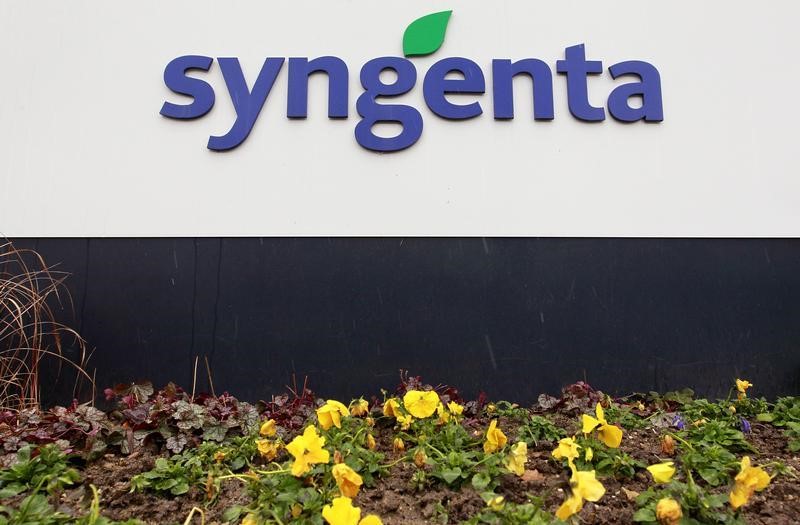By Tom Polansek
(Reuters) - China's barriers to imports of some U.S. genetically modified crops are disrupting seed companies' plans for new product launches and keeping at least one variety out of the U.S. market altogether.
Two of the world's biggest seed makers, Syngenta AG and Dow AgroSciences, are responding with tightly controlled U.S. launches of new GMO seeds, telling farmers where they can plant new corn and soybean varieties and how can the use them. Bayer CropScience told Reuters it has decided to keep a new soybean variety on hold until it receives Chinese import approval.
Beijing is taking longer than in the past to approve new GMO crops, and Chinese ports in November 2013 began rejecting U.S. imports saying they were tainted with a GMO Syngenta corn variety, called Agrisure Viptera, approved in the United States, but not in China.
The developments constrain launches of new GMO seeds by raising concerns that harvests of unapproved varieties could be accidentally shipped to the world's fastest-growing corn market and denied entry there. It also casts doubt over the future of companies' heavy investments in research of crop technology.
The stakes are high. Grain traders Cargill Inc (CARG.UL) and Archer Daniels Midland Co, along with dozens of farmers, sued Syngenta for damages after Beijing rejected Viptera shipments, saying the seed maker misrepresented how long it would take to win Chinese approval.
In the weeks since Cargill first sued on Sept. 12, Syngenta's stock has touched a three-year low. ADM in its lawsuit last week alleged the company did not follow through on plans for a controlled launch of Viptera corn.
Syngenta says the complaints are unfounded.
Bayer, told by Beijing in September that the new soybean seed, LL55, had not been approved for imports, says it will keep on trying, seven years after the company first filed its request. In the meantime, it will withhold the new seed. China granted its last import approval for any GMO grain in June 2013.
TEN YEAR EFFORT
"Our objective is to get the approval and the clearance from the Chinese authorities so that we can go into a full commercial launch as soon as possible," said Frank Terhorst, global head of seeds for the company.
It can take up to 10 years and $150 million to develop new GMO seeds and further delays in Chinese approvals will raise concerns about Bayer's future investment in new GMO products, Terhorst said.
The slowdown in Beijing's regulatory process comes amidst growing consumer sentiment against GMO food in China and concerns amongst some government officials about excessive dependence on U.S. food supplies.
China is a key market for the $12 billion U.S. agricultural seeds business and for global grain traders and accounted for nearly 60 percent of U.S. soybean exports and 12 percent of corn exports two years ago. Nearly 90 percent of corn in the United States is genetically engineered, according to the U.S. Department of Agriculture, as farmers embrace technology that helps kill weeds and fight pests.
It is a common practice to mix different corn varieties in storage and during transportation, so a lack of approval for one GMO variety can put at risk of rejection large shipments that include approved GMO grains.
The controlled releases by Dow and Syngenta aim to bring new GMO seeds to the U.S. market while assuring U.S. farmers and exporters that the harvests will not be rejected by countries that have not approved the GMO grain.
Dow AgroSciences this month said it will limit sales of its new genetically modified corn and soybeans next year while it waits for China's approval. Farmers who grow the new Enlist corn must maintain isolation areas around their fields, use the corn only as livestock feed, and submit to audits of their compliance.
When Syngenta released its Agrisure Duracade corn this year, which is approved in the United States but not by China, it contracted grain handler Gavilon, owned by Japanese trading house Marubeni Corp, to oversee the launch. Gavilon assigned as many as six workers at its Omaha headquarters to keep Duracade out of markets where it had not been cleared, said Greg Konsor, general manager for grain operations.
At harvest, growers have to fill out canary-yellow tracking agreements where they identify themselves, their trucking firms and the destinations for their Duracade corn. The bright color is meant to tell buyers the shipments require special attention.
Iowa farmer Gary Vetter said that after he planted 240 acres of Duracade last spring, he received calls and certified mail from Gavilon checking on his compliance with restrictions aimed to keep the grain out of unapproved markets.
"No matter what, they want to know where the corn goes," he said.
Controlled launches, however, are at best a temporary fix because they are costly, complicated and risk accidental contamination of other export grains, said Jim Sutter, chief executive of the U.S. Soybean Export Council.
"The long-term solution is to work with our partners in China and build confidence in the process in the way we want it to work," he said. "Easier said than done."
(Additional reporting by Niu Shuping in Beijing; Editing by David Greising and Tomasz Janowski)
